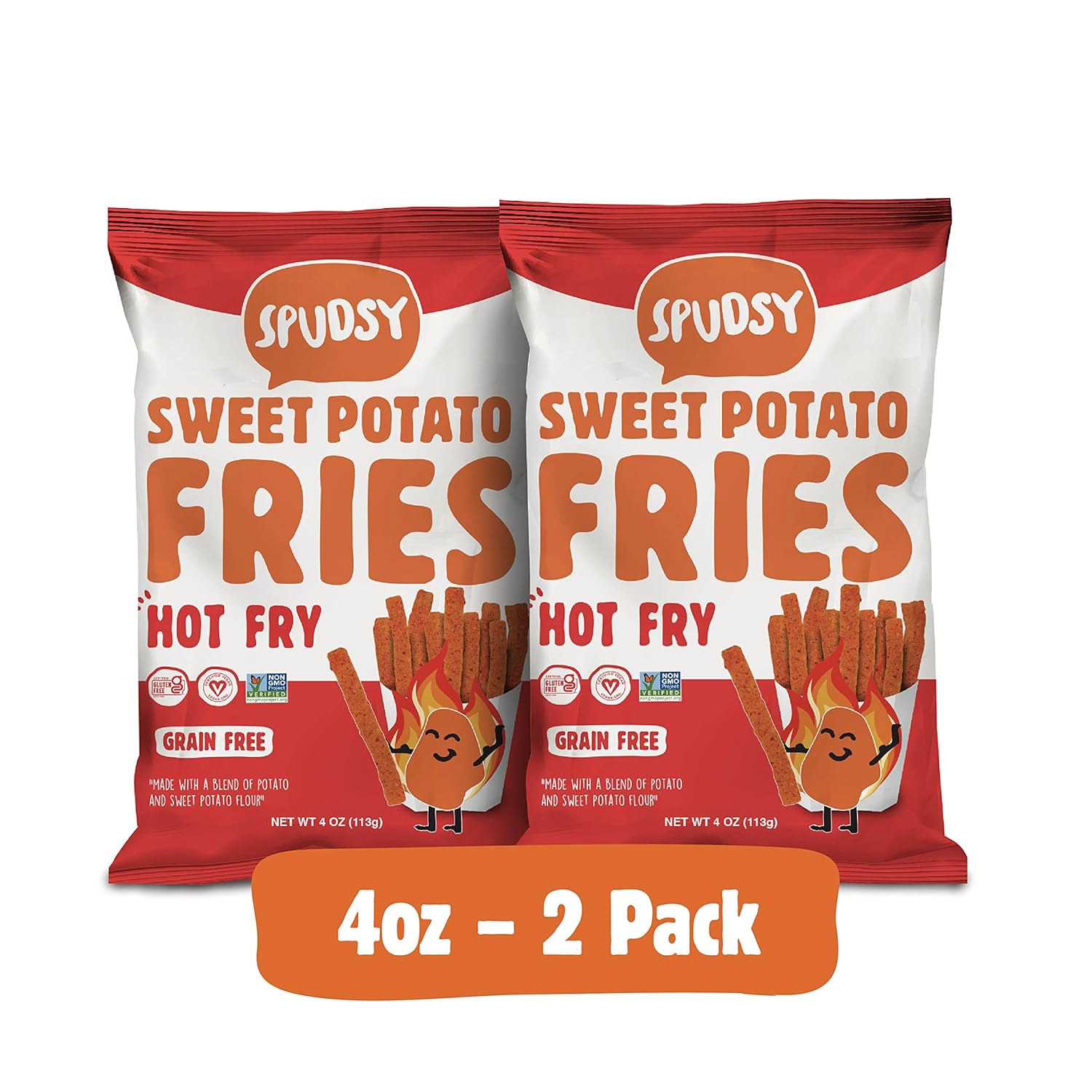Estimated reading time: 12 minutes
Introduction
In the ever-evolving world of dietary preferences, the question of whether hot fries are vegan has sparked much interest. This curiosity stems from a growing trend towards vegan-friendly snacking, reflecting broader concerns over health, environmental sustainability, and ethical food choices. Among the plethora of snack options, hot fries have come under scrutiny for their ingredients and manufacturing processes. Key considerations include the presence of animal-derived ingredients such as whey protein concentrate or cheese, which are critical determinants of a snack’s vegan status.
The demand for vegan snacks has led to significant shifts in the snack industry, prompting many brands to explore plant-based recipes. Flamin hot fries, for example, offer a fiery kick without compromising on crunch or flavor, appealing to a wide audience, including those following a vegan diet. Ingredients such as enriched corn meal and sunflower oil have become staples in creating these vegan-friendly alternatives. However, challenges persist, particularly in avoiding non-vegan components like disodium inosinate and ensuring that all ingredients, including riboflavin and enrich agents, align with vegan principles. This ongoing evolution in snack production highlights the complex interplay between taste preferences and dietary ethics, underscoring the importance of informed consumer choices in fostering a more sustainable and ethical snack market.
Key Takeaways for “Are Hot Fries Vegan?”
- Vegan Status of Hot Fries: Many hot fries brands have adapted their recipes to meet vegan standards, though this varies across different products. Always check the ingredient list for non-vegan items like whey protein or cheese.
- Homemade vs. Store-Bought Vegan Snacks: Making vegan hot fries at home allows for greater control over ingredients and nutritional content, while store-bought options offer convenience and variety.
- Nutritional Benefits of Vegan Snacking: Switching to vegan snacks, including hot fries, can lead to health benefits such as weight loss and improved well-being, though nutritional content varies across products.
- Environmental and Ethical Impact: Choosing vegan snacks, like zesty fries, reflects not just dietary preferences but also environmental and ethical considerations, such as reduced carbon footprint and animal welfare.
- Challenges in Vegan Snack Production: While the trend towards vegan snacks is growing, challenges remain, including balancing taste with health benefits and ensuring sustainability in production and packaging.
- Consumer Responsibility: As consumers, understanding the impact of our snack choices, both in terms of health and broader environmental and ethical implications, is crucial. Making informed choices can contribute to a more sustainable and ethical food system.
- Industry Trends and Innovations: The snack industry, including zesty fries manufacturers, is increasingly innovating to meet vegan demands, resulting in a wider range of tasty and ethical snack options.
The Rise of Vegan Snacking: A Closer Look at Hot Fries
In the ever-evolving world of dietary preferences, veganism has marked its significant presence. This shift has highlighted various food items, particularly snacks, and their alignment with vegan standards. Among these, hot fries have emerged as a subject of curiosity and debate. Let’s delve into this spicy world and uncover the vegan truth behind these popular snacks.
- Trends in Vegan Snacking: The vegan lifestyle has transcended beyond a mere dietary choice to become a global movement. In 2023, vegan-friendly snacks are not just a niche market but a mainstream demand, with many consumers seeking plant-based options even in their snack foods. This shift is not only motivated by health concerns but also by environmental and ethical considerations.
- Hot Fries as a Case Study in Vegan Snack Options: Hot fries, known for their fiery kick and irresistible crunch, stand at the intersection of popular snack culture and vegan curiosity. Brands like Chester’s and Andy Capp’s have been scrutinized for their ingredients, raising questions like “Are hot fries vegan?” and “Do hot fries contain dairy products like whey or cheddar cheese?”
What Defines a Vegan Snack?
To understand what makes a snack truly vegan, we must look beyond the absence of obvious non-vegan ingredients like meat and dairy. A vegan snack is defined not only by what it lacks but also by what it contains. The key lies in the ingredients list – a product free from animal-derived components such as milk, whey protein, and certain artificial flavors that might use animal by-products. Moreover, the manufacturing process also plays a crucial role. For instance, using separate fryers for vegan and non-vegan items can be decisive in maintaining vegan integrity.
“Navigating the snack aisle as a vegan isn’t just about avoiding the obvious; it’s about being vigilant and informed. Always check the label, because sometimes the devil is in the details,” says Derrick Draker, a renowned vegan lifestyle influencer.
Hot Fries in the Vegan Snack Market
As we analyze the position of zesty fries in the vegan snack market, it becomes evident that consumer preferences are pushing brands to rethink their recipes. The demand for vegan-friendly options has led to new products and even modifications to existing ones. However, the journey is not straightforward. Despite their best efforts, many popular brands still grapple with challenges like maintaining the flavor profile while eliminating ingredients like whey and cheese. The vegan snack market, including products like zesty fries, is dynamic, reflecting changing consumer preferences and evolving dietary trends.
Ingredient Deep Dive: What’s in Your Hot Fries?
Taking a closer look at the ingredients in your favorite snack, it becomes clear why hot fries are not vegan. Popular brands like Cheetos use a variety of components to achieve their signature taste and texture. A key ingredient, vegetable oil, is vegan-friendly and contributes to the crispy exterior. However, the presence of romano cheese in the ingredient list confirms that these snacks do not meet vegan dietary standards. This cheese adds a distinctive flavor but also includes animal products, making it unsuitable for those following a strict vegan diet. Understanding the ingredients can help consumers make informed choices that align with their dietary preferences and ethical considerations.
| Ingredient | Vegan Status |
|---|---|
| Whey Protein | Non-Vegan |
| Citric Acid | Vegan-Friendly |
Navigating Ingredients for Vegan Safety
Understanding the vegan status of snacks like zesty fries requires a vigilant examination of their ingredients. Identifying non-vegan components, such as whey protein, is crucial, often used for flavor enhancement but derived from dairy. On the other hand, ingredients like citric acid, commonly found in spicy snacks for tartness, are generally vegan-friendly. This discernment is vital for anyone committed to a vegan diet, ensuring their snack choices align with their ethical and dietary standards.
Case Study: “Vegan Ingredient Swap Success Story”
A popular brand of hot fries, once laden with non-vegan ingredients like cheese and whey protein, underwent a transformation. By substituting these with vegan-friendly alternatives, the brand retained the beloved spicy taste while aligning with vegan standards, setting a precedent in the snack industry.
Flavor and Veganism: Can They Coexist?
One of the biggest challenges in the vegan snack world is maintaining the delectable flavors people love while adhering to vegan guidelines. Spicy snacks, particularly zesty fries, often rely on ingredients like whey and cheddar cheese for their distinct taste. However, the emergence of vegan alternatives has shown that achieving that savory kick is possible without compromising on vegan principles. This evolution in snack manufacturing caters to the vegan population and opens doors to more inclusive food choices.

Vegan Snack Alternatives to Hot Fries
Exploring vegan snack alternatives to hot fries reveals a range of options beyond the usual suspects. While hot Cheetos and Chester’s Flamin’ Hot Fries are favorites among snack lovers, their use of artificial colors and ingredients that contain milk means they aren’t vegan. This highlights the challenge for those seeking plant-based versions of these fiery treats. However, the market offers solutions like vegan fries and vegetarian french fries that exclude animal products. Brands like Andy Capp’s Hot Fries have varieties that claim to be more inclusive, but careful label reading is advised since some products may still contain milk or other non-vegan ingredients. For a truly vegan-friendly option, looking for snacks specifically labeled as fries are vegan-friendly ensures adherence to vegan dietary standards without sacrificing flavor.
- Homemade Vegan Hot Fries Recipes: Crafting vegan hot fries in the comfort of your kitchen can be a delightful and rewarding experience. By using ingredients like sweet potato fries or potato fries and seasoning them with a blend of spices, vegans can enjoy a snack that’s not only delicious but also aligns with their dietary preferences.
- Commercially Available Vegan Hot Fries Alternatives: For those who prefer the convenience of store-bought snacks, there are several vegan-friendly options available. Brands have started recognizing the demand for vegan snacks, offering alternatives that ensure no compromise on taste or quality.
Crafting the Perfect Vegan Hot Fry at Home
Creating homemade vegan zesty fries is simpler than one might think. The key is using high-quality or sweet potato fries as the base. Season them with a custom blend of spices, including garlic and onion powder, to enhance the flavor. Remember to use vegan-friendly oils like sunflower or canola for frying or baking. Always check the labels of your spices and oils to ensure they meet vegan standards.
Case Study: “Homemade vs. Store-Bought: A Vegan’s Perspective”
This case study compares the experiences of creating homemade vegan zesty fries with purchasing them from stores. It highlights the satisfaction and control over ingredients that come with homemade cooking while acknowledging the convenience and variety offered by store-bought vegan hot fries.
The Best Vegan Hot Fries on the Market
Navigating the market for vegan hot fries can be overwhelming, but standout options consistently impress in terms of taste and ingredient quality. Brands like Chester’s and Andy Capp’s have been exploring vegan-friendly versions of their popular zesty fries. When choosing store-bought vegan hot fries, look for those that use natural flavorings and avoid artificial ingredients. It’s a journey of finding the right balance between convenience and adherence to vegan standards.
Health and Nutrition: Evaluating Vegan Snacks
When evaluating vegan snacks for their health and nutritional value, the discussion often turns to favorites like hot fries and potato chips. While some brands, such as Chester’s Hot Fries and Andy Capp’s Hot Fries, are scrutinized for their ingredients, it’s crucial to note that not all hot fries are vegan-friendly. For instance, Chester’s fries and Andy Capp’s versions may contain elements that are not suitable for vegans or use separate fryers for their fries to avoid cross-contamination. However, the market also offers options that are suitable for vegans, including companies that produce frozen fries designed to meet vegan standards. It’s important to eat hot fries that align with your dietary choices, keeping an eye out for those specifically marked as vegan. This ensures you’re not only enjoying your snack but also adhering to a vegan lifestyle without compromising on health and nutrition.
Nutritional Value of Vegan Hot Fries
| Snack Type | Nutritional Value |
|---|---|
| Vegan Hot Fries (Homemade) | High in dietary fiber, lower in saturated fat |
| Commercial Vegan Hot Fries | Varied; some options are high in sodium and artificial ingredients |
Nutritional Profile of Vegan Snacks
When evaluating vegan snacks, it’s crucial to consider their nutritional aspects. For instance, homemade vegan hot fries, often made with sweet potato fries or potato fries, can be a healthier option. They typically contain more dietary fiber and less saturated fat than traditional hot fries. However, not all commercial vegan snacks are created equal. While some brands offer nutritionally balanced options, others may still be high in sodium and contain artificial ingredients. It’s important to always check the labels for a clear understanding of what you’re consuming.
Case Study: “Nutritional Transformation Through Vegan Snacking”
This case study presents the journey of an individual who switched to vegan snacks, including zesty fries and experienced significant improvements in health. The transition led to weight loss and better overall well-being, showcasing the potential health benefits of plant-based snacking.
Balancing Taste and Health in Vegan Snacks
The challenge in vegan snacks, particularly those mimicking popular flavors like zesty fries, lies in balancing taste with health benefits. Manufacturers often face the dilemma of replicating the beloved flavors of traditional snacks while keeping the nutritional profile in check. The key is finding the right blend of spices and natural ingredients to enhance flavor without compromising health. For example, using garlic and onion powder instead of artificial flavorings can significantly improve the health quotient of vegan hot fries.
The Environmental and Ethical Angle of Vegan Snacking
In recent years, our food choices’ environmental and ethical implications have become increasingly significant, especially for snack foods. This is particularly true for popular items like zesty fries, where the shift to vegan options is not just a dietary choice but also a reflection of broader environmental and ethical considerations. Let’s explore the impact of this shift in the context of vegan snacks.
- Environmental Impact of Vegan Versus Non-Vegan Snacks: Vegan snacks, including items like vegan-friendly hot fries, often have a lower environmental footprint than non-vegan counterparts. Plant-based snacks typically require less water and land, resulting in lower greenhouse gas emissions. However, it’s important to consider the whole lifecycle of these products, as some vegan snacks may still have significant environmental impacts due to packaging or transportation.
- Ethical Considerations in Snack Production: The ethical dimension of snack production involves animal welfare, labor practices, and sustainability. Choosing vegan snacks like hot fries can be seen as a step towards a more ethical consumption pattern, avoiding animal exploitation and often supporting more sustainable agricultural practices.
Eco-Friendly Snacking: A Realistic Goal?
The pursuit of eco-friendly snacking is becoming more realistic with the advancement of sustainable production methods. The production of vegan snacks, including various brands of hot fries, is evolving to minimize environmental impacts. This includes efforts to reduce water usage, lower carbon emissions, and use sustainable packaging materials. However, challenges remain, such as ensuring a fully sustainable supply chain and addressing the energy consumption involved in snack production.
Case Study: “Green Snacking: An Environmental Success Story”
This case study highlights a snack brand that has made substantial progress in reducing its environmental impact while offering vegan options. The brand’s journey towards sustainability includes adopting renewable energy sources, minimizing waste in production, and sourcing ingredients ethically, setting an example in the snack industry.
Ethics Behind Your Snack Choices
Regarding the ethics of snacking, vegan snacks like zesty fries go beyond personal health and tap into broader concerns about animal welfare and sustainability. By opting for vegan-friendly options, consumers often indirectly support more ethical food production practices, such as avoiding animal cruelty and promoting more sustainable farming methods. It’s about making a conscious choice that aligns with one’s values, where every bite of a vegan snack reflects a stand for ethical and sustainable practices.

Conclusion
In conclusion, exploring whether hot fries are vegan has opened up a broader discussion about the nuances of vegan snacking. We’ve seen that while some brands have successfully transitioned their hot fries to be vegan-friendly, others are still on the journey. This highlights the importance of diligent label reading for those adhering to a vegan diet. Moreover, the case studies and discussions presented in this article underscore the multi-faceted nature of vegan snacks, from health and nutrition to environmental and ethical considerations.
The rise of veganism has not only transformed how we look at snacks like hot fries but also how we perceive our food choices concerning our health, the environment, and ethical standards. As the market continues to evolve, with more brands offering vegan options and consumers becoming more informed, we can expect a wider array of choices that align with diverse dietary preferences and values.
Whether you’re whipping up a batch of homemade vegan hot fries or picking a pack off the shelf, the journey towards more conscious snacking is underway. It’s a journey beyond just taste or dietary preferences — about making choices that resonate with our health goals and our collective responsibility towards the planet and its inhabitants.

James Dunnington leads the James Dunnington Collection, featuring five unique blogs: a practical Pet Care Guide, an enlightening Ancient History Blog, a resourceful Home Improvement Guide, a cutting-edge Tech Innovation Guide, and a strategic Online Money Making platform. Each site delivers valuable insights designed to empower and inform. For updates and more tips, visit our Contact Us page to sign up for our newsletter, ensuring you never miss out on the latest content from any of these dynamic fields.

